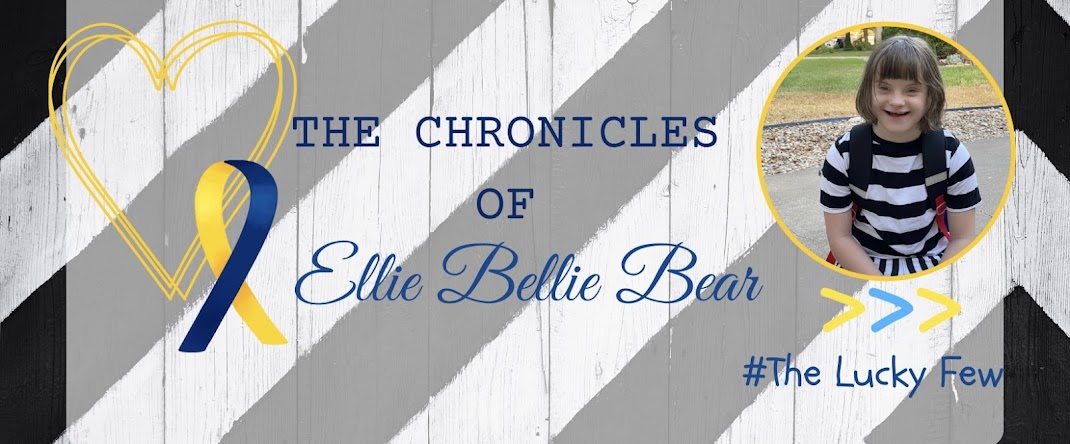I could go on and on about Down syndrome and my awesome daughter who sports her designer genes like no other, but instead, I will leave you with this adorably cute picture of Ellie:
 |
| Is she rockin' this extra chromosome, or what?! Where to find this awesome shirt. |
and a few facts about Down syndrome with some more pics scattered throughout:
- Down syndrome aka Trisomy 21 is a genetic syndrome present from birth. It is characterized by an extra copy of the 21st chromosome in every single cell. This means that a person with Ds has 3 copies of the 21st chromosome instead of just 2 copies. There are two other types of Down syndrome--Translocation and Mosaicism.
- Down syndrome is the most common genetic condition. It does not discriminate. In fact, Down syndrome loves all races, cultures, countries, religions, socio-economic status, and gender. It is equal opportunity designer gene lottery!
- While the incidence of having a child with Ds increases with maternal age, the fact is that 80% of all children with Ds are born to mothers under the age of 35. This is because of the higher fertility rate among younger woman. [Fact: this Mama Bear was 28 years-old when she got knocked up!]
- There are many stereotypes surrounding Down syndrome and while there may seem to be a little thread of truth behind them, they are just that-stereotypes. My favorite one is "They are happy all the time." My mommy world would be so much easier if Bear was truly happy all the time. In fact, just like you and me, people with Down syndrome experience all emotions including sadness, anger, fear, jealousy, happiness, excited, and happy.
- Just as we consider ourselves unique, a person with Down syndrome has her own personality. Her own strengths. Her own weaknesses. Her own likes, dislikes, and dreams. She is just that. . . a unique individual.
- People with Down syndrome have difficulty developing gross motor and fine motor skills due to low muscle tone and loose joints. Imagine wearing thick gloves and a thick snowsuit and having run in that and pick up small objects. That is what it feels like for my daughter as she tries to put together a puzzle, bring a spoon to her mouth, or as she tries to streak throughout the house.
- Oh and for those who have been told that people with Down syndrome never walk . . .
- Many people with Down syndrome have a hard time learning how to talk and may, at times, be difficult to understand. This is because of many factors such as low muscle tone (ie jaw and cheek muscles, tongue, lips), small mid-face, high arched palate, and abnormal dentition. I dare you to shove your mouth full of marshmallows and then try to say your "Sally sells seashells by the seashore". Tasty, perhaps? Difficult, yes!
- People with Down syndrome are happy with their lives and many of their siblings say that their lives have been enriched due to having a brother or sister with Down syndrome.
- Parents of those with Down syndrome love their children, are proud of them, and feel that their perception of live has improved because of their children.
- People with Down syndrome are contributing members to society. They hold down jobs. Some in sheltered workshops. Some as grocery store baggers and fast food clerks and some as preschool teachers, public speakers, and even restaurant owners. They enrich the lives of those around them and encourage people to look as the ABILITY in disABILITY.
- Adults with Down syndrome want to have meaningful relationships. They want to date and some even marry. Read about Monica & David or Shelley and Bill.
- From the mouth of my dear friend Julie at Upside Down: I never knew I wanted a child with Down syndrome until I was given one.
References:
Skotko BG, Levine SP, Goldstein R. 2011.
Having a brother or sister with Downsyndrome: Perspectives from siblings.
Am J Med Genet Part A 155:2348–2359.
Am J Med Genet Part A 155:2348–2359.
Skotko BG, Levine SP, Goldstein R. 2011.
Self-perceptions from people with Downsyndrome.
Am J Med Genet Part A 155:2360–2369
Am J Med Genet Part A 155:2360–2369
Skotko BG, Levine SP, Goldstein R. 2011.
Having a son or daughter with Downsyndrome: Perspectives from mothers andfathers.
Am J Med Genet Part A 155:2335–2347.
National Down Syndrome Society. www.ndss.org
Am J Med Genet Part A 155:2335–2347.
National Down Syndrome Society. www.ndss.org








Beautiful post, Anna. Thank you for sharing your superstar daughter!
ReplyDeleteWhat a thorough post xo.
ReplyDeleteAnd I am knocked flat down by Ellie's beauty every single time I look into photos with her exquisite eyes.
oh she is gorgeous! And looks like a handful!
ReplyDeleteI ran into your blog while searching for an image of something that has nothing to do with your family, your blog, or Ellie's condition. I have to say, you and your Ellie (and I would imagine, your husband) are heroes. I can't tell you how much I admire you all. And I'm sure you're helping many parents and children in similar situations. If I run across anyone with such a situation, I will be sure to direct them to this blog.
ReplyDeleteThank you, Gloria! What a kind and wonderful thing to say :-)
DeleteThis comment has been removed by the author.
ReplyDeleteThis comment has been removed by the author.
ReplyDeletePlease contact me, I looked exactly like her when I was her age, I have been trying to find my real parents for years, please help me!
ReplyDeleteThanks and I have a neat provide: Where To Loan For House Renovation house renovation ideas interior
ReplyDelete